 Petzlover
Petzlover Bulgarian Shepherd is originated from Bulgaria but Kanni is originated from India. Bulgarian Shepherd may grow 8 cm / 4 inches higher than Kanni. Bulgarian Shepherd may weigh 35 kg / 78 pounds more than Kanni. Bulgarian Shepherd may live 41 years more than Kanni. Both Bulgarian Shepherd and Kanni has almost same litter size. Bulgarian Shepherd requires Moderate Maintenance. But Kanni requires Low Maintenance
Bulgarian Shepherd is originated from Bulgaria but Kanni is originated from India. Bulgarian Shepherd may grow 8 cm / 4 inches higher than Kanni. Bulgarian Shepherd may weigh 35 kg / 78 pounds more than Kanni. Bulgarian Shepherd may live 41 years more than Kanni. Both Bulgarian Shepherd and Kanni has almost same litter size. Bulgarian Shepherd requires Moderate Maintenance. But Kanni requires Low Maintenance
 The Bulgarian Shepard Dog comes from the ancient line of Molossers of Central Asia and Tibet, and the shepherds of the Balkans, Turkey and Caucasus. Among the oldest and most valued of the working dogs of Europe, the Bulgarian Shepherd breed was created by mixing the Balkan breeds with the dogs from Central Asia by the proto-Bulgarians around the 7th century. The Karakachanskoto Kuche was introduced to Bulgaria and accepted by the sheep herders. Mixing this breed in with the Balkan and Central Asian mix developed the Bulgarian Shepherd we know today. In the long run the original Karakachanskoto Kuche became extinct, replaced entirely by the Bulgarian Shepherd even in places where the new breed is still called by the Kuche name. Although the breeds are not the same, most of the dog world does not know the difference.
The Bulgarian Shepard Dog comes from the ancient line of Molossers of Central Asia and Tibet, and the shepherds of the Balkans, Turkey and Caucasus. Among the oldest and most valued of the working dogs of Europe, the Bulgarian Shepherd breed was created by mixing the Balkan breeds with the dogs from Central Asia by the proto-Bulgarians around the 7th century. The Karakachanskoto Kuche was introduced to Bulgaria and accepted by the sheep herders. Mixing this breed in with the Balkan and Central Asian mix developed the Bulgarian Shepherd we know today. In the long run the original Karakachanskoto Kuche became extinct, replaced entirely by the Bulgarian Shepherd even in places where the new breed is still called by the Kuche name. Although the breeds are not the same, most of the dog world does not know the difference.
In Bulgaria however the Karakachan is a national treasure and the history of the breed runs deep. One Kuche could run up to 1200 animals and hundreds were used by the herdsmen in the mountains of Bulgaria. There were many regional types of Bulgarian Shepherds with very little difference between those types. These dogs were so prized by the shepherds that the dogs ate first before the people. The dogs however ate a vegetarian diet of milk, wheat, water and oats. The Bulgarian Shepherd lives a long life of often over 20 years. The Bulgarian Army made good use of these dogs early in the 20th century.
Following World War II, the wolves were close to extinction and property in Bulgaria was nationalized. There was no longer a need for a large force of working dogs. The Communist government exterminated large numbers of sheep dogs including the Bulgarian Shepherd. Only those species on government owned farms and in remote regions survived. When the government farms were disbanded in the early 20th century, these dogs were exterminated as well. Only those in the mountains survived. Commercial breeding of the Bulgarian Shepherd in the end of the century has resulted in controversy as other breeds came into the breeding program.
Use of breeds such as Sarplaninacs, Caucasian Ovcharkas, St. Bernards, Central Asian Ovcharkas and Bosnian Tornjaks in these programs resulted in Bulgarian Shepherd or Karakachans that were a lot different from the original breed. There is therefore some concern about the future of the breed in Bulgaria, yet they received official Bulgarian national recognition in 2000. Today’s Bulgarian Shepherd is a guard dog for both property and livestock.
The official standard for the breed came about in 1991 and in 2005 it was recognized by the Bulgarian State Commission for Animal Breeds. Only those dogs that meet this standard are considered “true” Karakachans. The Bulgarian Shepherds are willing to fight bears and wolves in defense of its family and flock. The dog is brave and loyal, dignified and powerful. They are recognized by both the Dog Registry of America, Inc. (DRA) and the Bulgarian Republican Federation of Cynology (BRFC) a member of the FCI.
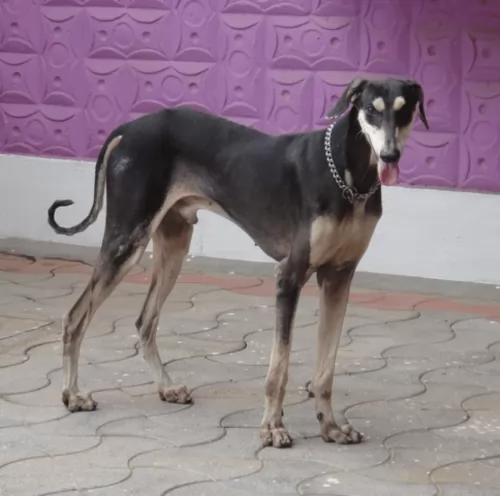 The Kanni dog is a rare South Indian Sighthound. It is also known as the Maiden's Beastmaster and this is because it is known to be protector and defender of its owner's property.
The Kanni dog is a rare South Indian Sighthound. It is also known as the Maiden's Beastmaster and this is because it is known to be protector and defender of its owner's property.
During ancient times, the dog was used for hunting but today it is essentially kept as a pet and it is registered with the Kennel Club of India.
 A massive, powerful and muscular Molosser, the Bulgarian Shepherd is strong, agile, powerful and fast. They are intelligent and reliable. They have a long, thick, harsh coat in white with patches of black. Their skull is massive and broad with a furrowed forehead. The muzzle is massive as well while the nose has wide nostrils and is fairly large. It has close fitting, thick lips with strong, scissor bite jaws. The Bulgarian Shepherd’s eyes are deep, oblique and small. They are either hazel or dark. They have an intelligent and confident, yet firm almost grim expression.
A massive, powerful and muscular Molosser, the Bulgarian Shepherd is strong, agile, powerful and fast. They are intelligent and reliable. They have a long, thick, harsh coat in white with patches of black. Their skull is massive and broad with a furrowed forehead. The muzzle is massive as well while the nose has wide nostrils and is fairly large. It has close fitting, thick lips with strong, scissor bite jaws. The Bulgarian Shepherd’s eyes are deep, oblique and small. They are either hazel or dark. They have an intelligent and confident, yet firm almost grim expression.
Their ears are low set, small and v-shaped. They sit close to the head which sits on a powerful but short neck. They have a broad back, well-muscled body with a deep chest and long, rough tail. Their gait is a trot with a spring in their step. There are two types of coats – longhaired and shorthaired with no undercoats.
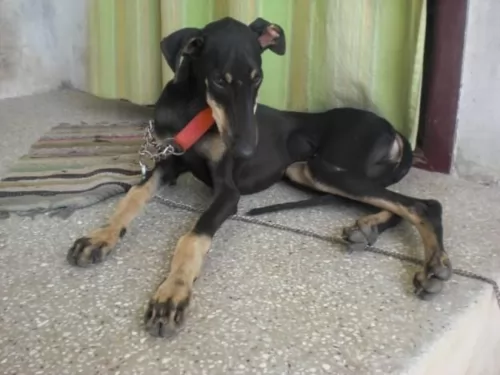 These dogs are tall, slim and deep chested, coming in two-color combinations, but it is the black and tan variety that is the true Kanni. There is also a cream variety. There are other color variations and each color has a unique name connected to it. The coat of the Kanni is short and smooth.
These dogs are tall, slim and deep chested, coming in two-color combinations, but it is the black and tan variety that is the true Kanni. There is also a cream variety. There are other color variations and each color has a unique name connected to it. The coat of the Kanni is short and smooth.
They are medium sized dogs standing at 62 to 67cm at the withers and weighing in the region of 18 – 22kg. When you first look at these dogs you might think of them as being similar to a Greyhound in looks. This is also because of their lean, muscular looks.
The eyes are a golden color, the nose black and the ears are a medium size and floppy with the long tail being semi-curved.
The Kanni has always been a hunting dog so he is used to being sharp, strong-willed, independent and alert as well as having some aggressive tendencies. It is also quite a reserved dog but he shows love and loyalty to his owner. He is independent and easy to train. It is a good thing to have him trained and socialized so that he is obedient to the simple commands you give him.
 This is a working dog, intelligent and independent guard dog. Reserved around strangers but loyal and devoted with his family. Tolerant of children in their family if they were raised with them. Not only will she defend human family members, she will guard and defend household pets as well. He is quite capable of making her own independent decisions. These are very intense guard dogs that will respond aggressively if they think their people are being attacked.
This is a working dog, intelligent and independent guard dog. Reserved around strangers but loyal and devoted with his family. Tolerant of children in their family if they were raised with them. Not only will she defend human family members, she will guard and defend household pets as well. He is quite capable of making her own independent decisions. These are very intense guard dogs that will respond aggressively if they think their people are being attacked.
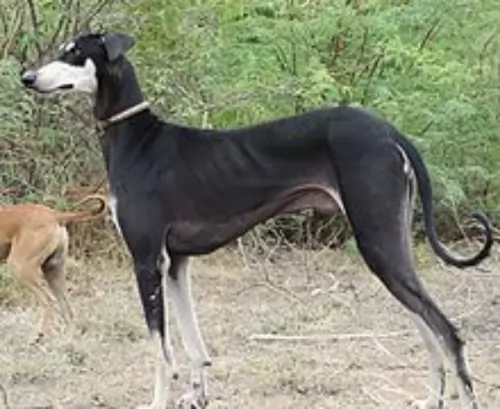 The Kanni looks much like your regular Doberman Pinscher but he has long tail and floppy ears. He is slim and agile but also powerful being able to have bursts of speed. It is why he requires a large place to run and play in, being better suited to a home with a large garden or farm.
The Kanni looks much like your regular Doberman Pinscher but he has long tail and floppy ears. He is slim and agile but also powerful being able to have bursts of speed. It is why he requires a large place to run and play in, being better suited to a home with a large garden or farm.
He is a playful, quiet dog but he has quite a bark on him and is known to be a good watchdog because of this. He is a protective dog too, devoted and loyal and making a splendid family pet.
 The breed itself is known to be healthy but they do face some of the usual health issues of the massive, giant breeds. This includes knee and elbow dislocation; hip dysplasia; bloat; entropion and osteosarcoma. All of these conditions require medical intervention, but bloat and osteosarcoma are the deadliest. Bloat needs immediate attention and osteosarcoma is a deadly bone cancer.
The breed itself is known to be healthy but they do face some of the usual health issues of the massive, giant breeds. This includes knee and elbow dislocation; hip dysplasia; bloat; entropion and osteosarcoma. All of these conditions require medical intervention, but bloat and osteosarcoma are the deadliest. Bloat needs immediate attention and osteosarcoma is a deadly bone cancer.
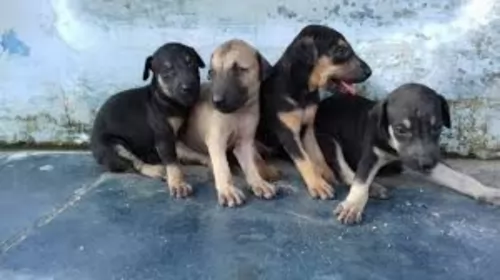 Not much is known about inherited health problems in this breed, and he can live up to a ripe old age of 16. It seems a pretty healthy dog, but still it helps to be aware of some of the more common dog illnesses that your pet can succumb to.
Not much is known about inherited health problems in this breed, and he can live up to a ripe old age of 16. It seems a pretty healthy dog, but still it helps to be aware of some of the more common dog illnesses that your pet can succumb to.
For first time dog owners it can be difficult knowing what health problems our beloved pets could suffer from. Every dog breed has certain diseases to which they are more prone to, but these are some common issues that most of our 4-legged friends will face -
This is a common dog health problem in India with the Kanni. There are so many things that disagree with their digestion. Most dogs may not want to eat their next meal, but when he is lethargic, he is hot and is vomiting, it is time to get your pet to the vet. This is because diarrhea causes rapid dehydration in dogs. To avoid diarrhea, steer clear of certain foods such as milk and dairy products as well as old, spoiled fatty foods. With diarrhea your dog must always have access to fresh, cool water.
This is a common dog disease, and ear infections can be painful and frustrating for your pet. He’ll scratch at his ear, shake his head and the inside of the ear may be red with a discharge. Check his ears for redness and try to keep them free from wax build up and dust.
Cleaning the ear is quite simple, and if you’re not sure how, the vet can do it quickly and effectively. Usually some dog ear cleaning solution on some cotton wool can do the trick. Ear infections are common in dogs like the Kanni with floppy ears.
It is essential to control fleas on your dog from word go. Fleas thrive in warm temperature and humidity and your pet will scratch, bite and lick at the spot. When you brush your pet, look through his fur for fleas and tell you vet about it if you discover ticks and fleas. A topical ointment could nip the problem in the bud. You may want to consider a flea collar for your pet.
Tapeworms, hookworms and roundworms for instance are commonly found in dogs, and even for healthy dogs, deworming tablets should be given from time to time. If your dog has worms, you’ll notice lethargy, loss of appetite, diarrhea and vomiting. It may be time to get your pet to the vet.
 These are large dogs with large appetites, but you want to keep them lean and active. Feed them at least twice a day with a high quality large or giant dog dry food. Four to five cups of food per day is the maximum.
These are large dogs with large appetites, but you want to keep them lean and active. Feed them at least twice a day with a high quality large or giant dog dry food. Four to five cups of food per day is the maximum.
Patellar Luxation – a floating kneecap or dislocated knee. Will cause lameness.
Osteosarcoma – bone cancer must be treated immediately as it is potentially fatal.
The Bulgarian Shepherd needs a good amount of exercise every day. Remember this is a working breed and they need a job. Long walks every day are essential for his well-being.
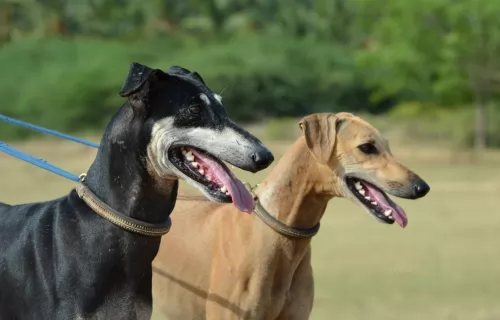 The Kanni is a low maintenance dog with his short coat. You can give him a good brush twice a week, check that his nails don't grow too long and also check his ears inside and out. Ticks and fleas are rife in hot weather and you want to give your dog a thorough check for these. You should also be checking your dog's teeth and brushing them 2 or 3 times a week. Dental problems can cause havoc with your dog's health.
The Kanni is a low maintenance dog with his short coat. You can give him a good brush twice a week, check that his nails don't grow too long and also check his ears inside and out. Ticks and fleas are rife in hot weather and you want to give your dog a thorough check for these. You should also be checking your dog's teeth and brushing them 2 or 3 times a week. Dental problems can cause havoc with your dog's health.
As a hunting breed, the Kanni is used to running so his needs for a good amount of exercise are quite high. While they do make good family pets, they hanker after wide open spaces and being busy. If you own one of these dogs, make sure that you exercise him often because otherwise he becomes frustrated and unhappy.
This dog has always been used to village life where he is free to roam wide open spaces. He is much more suited to country life than to city life, and as a pet, you will need to ensure that he receives a good amount of exercise.
Take him for walks, and if he's been socialized and trained, take him to the park and allow him off his leash to run.
The dog has always been fed traditional food such as porridge and milk but we know better now that dogs need protein too as well as a diet rich in vitamins and minerals to ensure his health.
You can feed him a top quality commercially manufactured dog food and add in some cooked chicken, rice and vegetables from time to time. It is expensive, but if you can, try and add in some raw meat occasionally as well. Your Kanni dog must always have access to fresh, clean water.